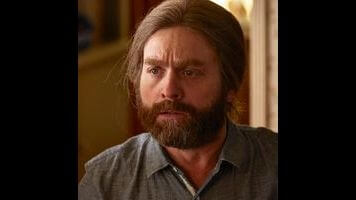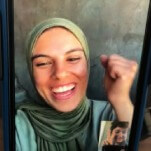Sitcoms tend to develop supporting characters much slower than their main cast because they often primarily act as comic relief; it’s much easier to keep them in the background for punchlines than to give them dramatic stories. The hard-nosed, marble-mouthed Eddie is a great example of a character that steals every scene he’s in just by being a specific, absurd creation. While it would be fine if Galifianakis kept Eddie around solely as a gag, it’s much appreciated to see the character take center stage in a road trip episode where Ernest Adams can really flex his comedic timing and malleable facial expressions to maximum effect.
In short: After Bingo the Clown upchucked at the rodeo last week, Eddie had to kill a bull when it tried to jump the fence to gore Bingo sending the crowd into a riotous frenzy. Eddie then enlists Chip and Martha’s help to presumably track down and kill Bingo. Chip nervously tells Martha to call the police if things get out of hand, but ultimately Eddie just wanted to travel to Nevada to gift a gun to his estranged son at his birthday party, but not before stopping off at his favorite hooker’s place. It’s a low-key, ambling episode that mostly revels in small, sweet character moments, like Eddie kindly reaching out to Martha to tell her that she’s just as strange as him and Chip, or the look on Chip’s face when he realizes that Eddie brought him along to entertain his son.
It’s also nice to see Baskets in a lighter register. Though the series certainly has its very funny moments, Baskets tends to operate as a half-hour dramedy. When it does indulge in humor, it tends to be either really dark or quite broad, and while those jokes almost always land, they sometimes feel like deliberate palette cleansers for what’s mostly a pretty serious existentialist drama. But outside for its last scene, “Cowboys” nicely hits the gas on the comedy; everything from its first sight gag of a crudely dressed donkey right after Chip deflects protestors’ questions about animal cruelty to the close-up of Eddie sleeping with his eyes wide open to the pure slapstick of snake bites really, really works. Galifianakis nicely illustrates Baskets’ comedic range by varying the humor between character-based comedy and pure silliness.
Yet, the best Baskets episodes really do somehow find a sweet spot between comedy and drama that elevates both the characters and the narrative to the sublime. I’m thinking of Christine and Chip’s sweet moment together at the casino interrupted by a enthusiastic gambler, or when Chip’s ridiculous yet gentle foray into family life runs the gamut between trying to fix teen bullying and pumping up a young girl’s self-esteem. The one thing that really holds “Cowboys” back from the top-tier is that it feels comfortable keeping Eddie at a comedic distance, as if delving into the character would compromise his function in the series as a weird overseer. It touches upon it in the scene with his family at the end, especially his advice to Chip never to start a family because kids can be “mean little bastards,” but it never really feels enough. But “Cowboys” splits the difference with the sweet scene between Chip and Eddie’s prostitute friend Thelma (Meg Foster) that works as a twisted mother-son scene between a loser-in-training and a veteran loser. There’s an instant connection between the two of them as Thelma almost innately understands Chip’s dream to be a clown, but though it makes an impression, it never really develops beyond that. (There’s a version of this episode just set at Thelma’s house that would have been wonderful.) Nevertheless, “Cowboys” delivers enough comedy to make the episode mostly a pleasant departure from the series’ typical modus operandi.
But the last scene brings Baskets back into the dramatic fold when Penelope finally tells Chip why she returned to Paris. Director Jonathan Krisel focuses in on Galifianakis’ face as he processes and comes to terms with the betrayal from his mother, a loving figure whom he feels guilty for never pleasing. While Martha prattles on about breakfast food in the background of the frame, Krisel makes sure viewers stay fixed on his eyes that telegraph both murderous rage and profound disappointment. “Take me to my mother’s, please,” Chip says calmly, opening the doors to Baskets’ final stretch of the season, which can only come soon enough.
Stray observations
- In case you were wondering what happened to Bingo, Eddie paid his cousin $50 to break both his legs. “Both of them?” Chip asks. “Yep,” Eddie replies.
- The snake biting gag probably stands up with the “bee in the motorcycle helmet” and cricket gags as some of the best comedy in the series to date.
- The whole discussion between Thelma, Martha, and Chip about Willie Nelson’s meanness is just stellar.
- Chip asks Martha to call the police if things get hairy, but Martha’s uncomfortable with “the pigs.”
- “Does that make us complicit? Or liable? Or libel?” “Possibly. All three. I dunno.”
- “That’s how a dirty fighter does it. Throws cocaine in your eyes.”
- “It’s not a fill-in station, honey!” “Well, it kinda is.”
- “You haven’t been drinking have you?” “Oh, no. If I were drinking, I’d be a lot more confident now.”
- “If I pull over, I have to break cruise control. Is it worth it?”
- “My father gave this to me at your age. It totally screwed my life up. You’re old enough now. You might as well have it.”









































